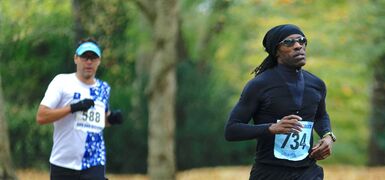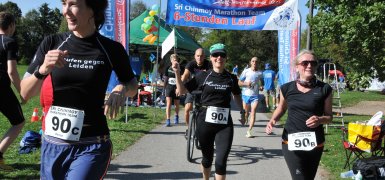Appropriately dubbed ‘the First Lady of the marathon’ Norweigan Grete Waitz became a role model for millions of women by putting women’s running into the limelight in the seventies and eighties and by giving it the worldwide attention and prestige it deserved.
Waitz started out on the track, being an Olympian 1500 metre runner in 1976, when she reached the semi-finals. She ran a world record in the 3000 metres on the track in 1975 and 1976 and in the 10K on the road in 1980 and became world cross-country champion a grand total of five times. But her greatest successes and glories would be found in the marathon, for which she became at once the first female champion and its foremost ambassador.
Waitz’ marathon journey commenced in 1978 when she ran her first New York City marathon. Despite of training reasonably little she set a world record time of 2:32:30 and finished with a nine minute lead over the next woman. Her award at the time was a twenty dollar bill which paid for her cab-fare to the airport. Yet the world had discovered a real champion and she became the cynosure of media-attention. The next year she sharpened the world record to 2:27 and a year later she brought it down to 2:25, both times in the New York marathon, which she won a total of nine times during her career. Her first three marathon attempts were all good for a world record. Her title of world’s best therefore came as no surprise when she won the first World Championships marathon in Helsinki in 1983.
Everybody expected Waitz to win gold at the first ever woman’s marathon at the Olympic Games of 1984 in L.A. But it was not to be. A nagging back injury kept Waitz out of her concentration for the first part of the race and when America’s Joan Benoit made her historic move after only three miles she did not have the strength to respond. Benoit kept her lead throughout the entire race and wrote history, whereas Waitz grabbed silver. However, her cheerful spirit brooked no disappointment or frustration. And although the Norwegian press considered her silver medal a failure, Waitz could not help but laugh at their short-sightedness. Her response is flooded with her natural wisdom: “Why are you disappointed? You haven’t run. I’m the one who has run and I’m satisfied, so why can’t you be satisfied as well?”
Apart from her grandiose achievements and victories the most significant thing Grete Waitz accomplished in her running career is that she gave women’s running the importance and value it needed to be ranked equally alongside the men. Although she certainly wasn’t the only one, she most certainly was the most influential. Owing to Waitz’ great performances in the marathon, her unassuming, kind and self-giving nature and her encouragement to women all over the world to start exercising and become fit, Grete Waitz became the inspiration behind the growing respect and enthusiasm people developed for women’s running. When Waitz first started running in 1966 there was hardly any room for women in the sport. There was no woman’s Olympic marathon – in fact women were not allowed to participate in the marathon at all – nor a woman’s 3,000 or 10,000 metres Olympic race, nor was there any prize money involved for female runners. In 1990, when Waitz ended her competitive career, all these things had changed and women’s running had earned a status equal to that of the men.
And aside from being a great runner Grete Waitz is also a great human being: kind, humble, down-to-earth and always quite averse to all the attention and fame her running brought her.
By: Abhinabha Tangerman, Sri Chinmoy M.T. Holland



